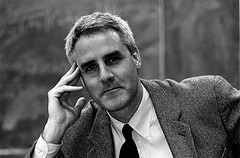Earthly Pursuits
Beginning this fall, Coleman, Associate Professor of Psychology and Education and Director of TC’s International Center for Cooperation and Conflict Resolution, will be among the first group of professors from different schools across Columbia to assume joint faculty appointments at the institute.
Over the past decade, the Institute has emerged as a leading research center focused on sustainable development, drawing on a range of scholars with varied backgrounds from biology and agronomy to economics and climate research.
“The Earth Institute is trying to effect significant change in some very dire and complex social systems and many of them are, in fact, in the middle of conflict zones,” Coleman says. “This is an excellent opportunity for us because I bring both a social psychological and complexity science lens to bear on these projects, and we gain access to learn on-the-ground about a wide variety of different conflicts in the international domain.”
Coleman first began working with the Earth Institute a year ago, when he was invited by Sachs and Columbia President Lee Bolinger to join its academic committee made up of Columbia faculty. Sachs, who serves as Special Representative of the United Nations for the Millennium Development Goals—eight international objectives to reduce extreme poverty, hunger, and disease by the year 2015—and who is special advisor to UN Secretary-General Ban Ki-Moon, had been contemplating an initiative to disseminate research on conflict resolution to policymakers and those working in war zones.
Coleman, however, suggested an alternative focus for the project—one gear not on preventing conflict and violence but rather on establishing sustainable peace. This orientation not only incorporates ideas and methods of conflict resolution and violence prevention, but also addresses the necessary and sufficient conditions for maintaining a lasting end to hostilities in a country or region.
Working with the Institute, Coleman and Dr. Gary Belkin, Director of the Program in Global Mental Health at the New York University School of Medicine, convened a meeting in March of scholars, UN officials, directors of international nongovernmental organizations, and philanthropists to discuss the current state of research and practice on sustainable peace. As a result, Coleman and TC Professor Emeritus Morton Deutsch have commissioned a group of psychologists to author a series of chapters for a book that they will edit on the psychological dimensions of sustainable peace.
In July, Sachs invited Coleman to join an international advisory group who traveled to Haiti on a fact-finding mission for the UN. The goal was to learn about the current situation in the country in order to eventually provide the Haitian government, UN officials, and the international community with recommendations on number of fronts, from economic development to easing potential conflicts.
“My primary responsibilities as a member of the faculty of the Earth Institute will be to marshal efforts related to sustainable peace,” Coleman says. “It could have different components, including the development of an interdisciplinary course, a multidisciplinary theory development project, publishing the book, and continuing work in the field. We know a lot about conflict and violence and the conditions that lead to destructive conflicts today, but much less about the conditions that foster sustainable peace. This is an excellent opportunity to begin to reorient our work from problems to solutions.”
Published Friday, Aug. 21, 2009
